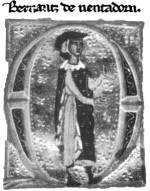 Among the most romantic figures of the medieval era were the French troubadours, poets who wrote of romantic love in delicate and beautiful verse that survives to this day. Perhaps the most famous of the troubadours was Bernard de Ventador, also known as Bernard de Ventadorn, the son of a Boulanger – a servant whose job it was to heat the ovens in the castle to bake bread and a house servant. This was the history attributed to Ventadorn by the vidas, biographical histories of the troubadours, but at least one contemporary slyly hinted that Bernard was actually the son of the Count d’Eble, the Monseignur of Ventadorn. It’s difficult to separate fact from legend after eight centuries, and what can be found about Ventadorn in contemporary research is often as lyrical and flowery as the man’s poetry.
Among the most romantic figures of the medieval era were the French troubadours, poets who wrote of romantic love in delicate and beautiful verse that survives to this day. Perhaps the most famous of the troubadours was Bernard de Ventador, also known as Bernard de Ventadorn, the son of a Boulanger – a servant whose job it was to heat the ovens in the castle to bake bread and a house servant. This was the history attributed to Ventadorn by the vidas, biographical histories of the troubadours, but at least one contemporary slyly hinted that Bernard was actually the son of the Count d’Eble, the Monseignur of Ventadorn. It’s difficult to separate fact from legend after eight centuries, and what can be found about Ventadorn in contemporary research is often as lyrical and flowery as the man’s poetry.
Born into a servant family in Limousin in Provence at the Castle Ventadorn, Bernard is said to have grown handsome and quick-witted, and to have captured the eye of the lady of the house. He fell in love with her – and she with him – and wrote poems and songs extolling her beauty and grace and his feelings for her. When her husband, Bernard’s patron Count Eble, realized who it was that Bernard was writing for, Bernard was driven from the castle and made his way to Provence, where he eventually became enamored of Alienor d’Aquitaine, the Eleanor who crossed the Channel to marry Henry Plantagenet, Henry II of England.
His poetry celebrated nature and love, and concerned itself often with the unrequited love of a poor young man for one of the fine noble ladies from whom he was separated by society and notions of class. Bernard concerned himself with the art of poetry as much as with the sincerity of his emotions, making him one of the true masters of the troubadour’s art. His work is characterized by its use of traditional themes – the cruelty of a beautiful woman, the pains of love – that were made famous by the French troubadours of the twelfth century. It has a melancholy tone, and makes use of subtle imagery and symbolism to describe the plight of a poor man in love with a woman far above his station.
Bernard de Ventadorn wrote lyric poetry in oc, a medieval Provencal language that has been compared to modern Esperanto. The simple melodies and intricately beautiful lyrics were traditional expressions of ‘courtly love’, celebrating romantic devotion to a sexually unattainable woman, usually the wife of another man. Over the centuries, those works have been further romanticized and imbued with mystical significance, suggested as metaphors for political and religious dialogues and analyzed as commentary on the daily lives of the nobility of those ages.
It is said that when Eleanor of Aquitaine left Provence for England, Ventadorn remained behind, so heartbroken that he abandoned poetry and joined the order of Dalon, where he remained until his death.


You must register to comment. Log in or Register.